Impact of Psychological Stress on Cortisol Levels and Health Outcomes
VerifiedAdded on 2022/11/15
|9
|3194
|491
Essay
AI Summary
This essay delves into the physiological responses to psychological stress, focusing on the role of cortisol. It examines how stress triggers cortisol release from the adrenal gland, leading to inflammatory responses and various physical and psychological effects. The essay discusses the hypothalamus's role in regulating cortisol and explores both short-term and long-term health consequences of elevated cortisol levels, including depression and immune function disruption. Furthermore, it highlights different coping strategies and therapies, such as stress-relieving techniques, anti-inflammatory diets, and lifestyle modifications, to mitigate the negative impacts of stress and reduce cortisol levels. The essay concludes by emphasizing the long-term health implications of chronic stress and increased cortisol, underscoring the importance of effective stress management.
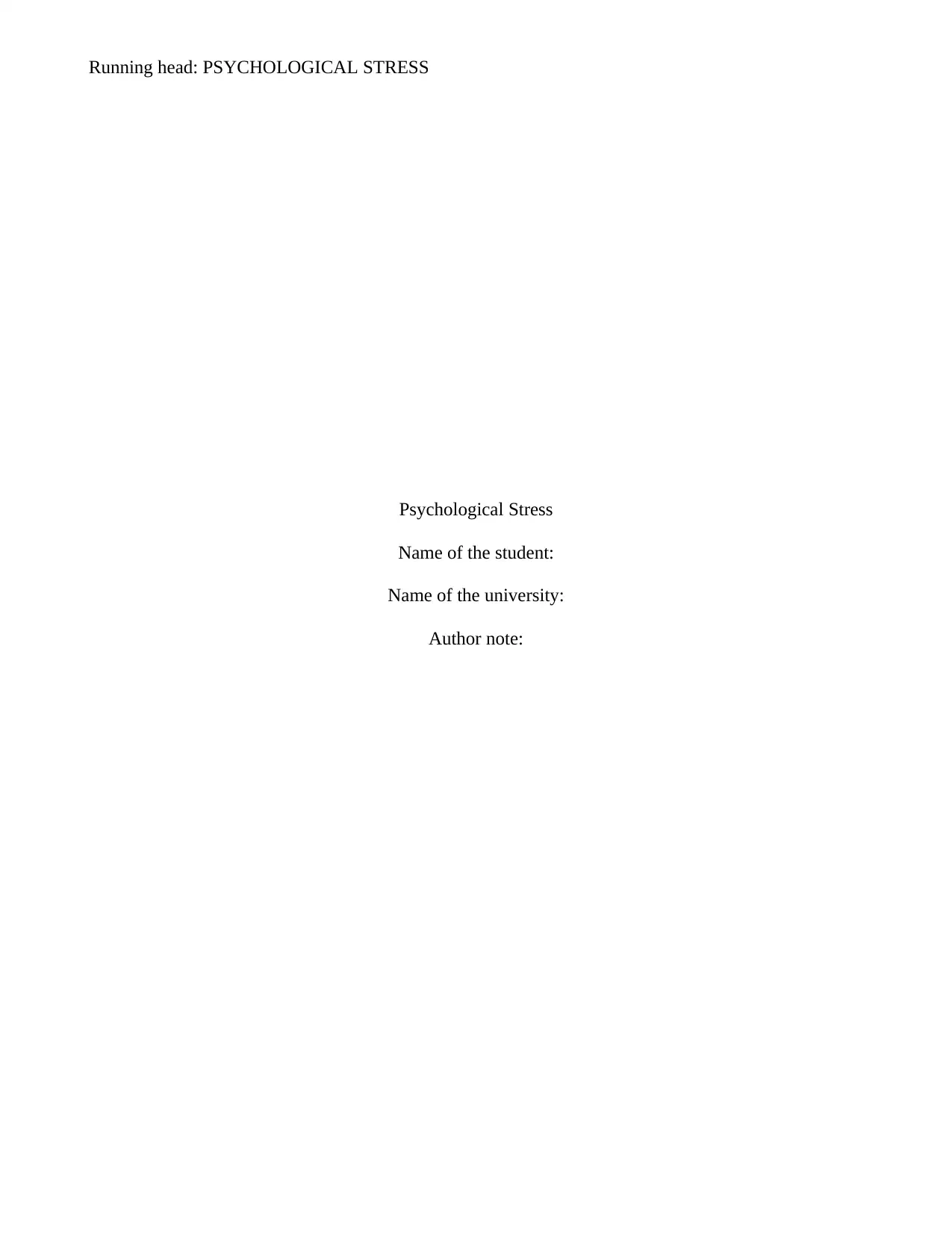
Running head: PSYCHOLOGICAL STRESS
Psychological Stress
Name of the student:
Name of the university:
Author note:
Psychological Stress
Name of the student:
Name of the university:
Author note:
Paraphrase This Document
Need a fresh take? Get an instant paraphrase of this document with our AI Paraphraser
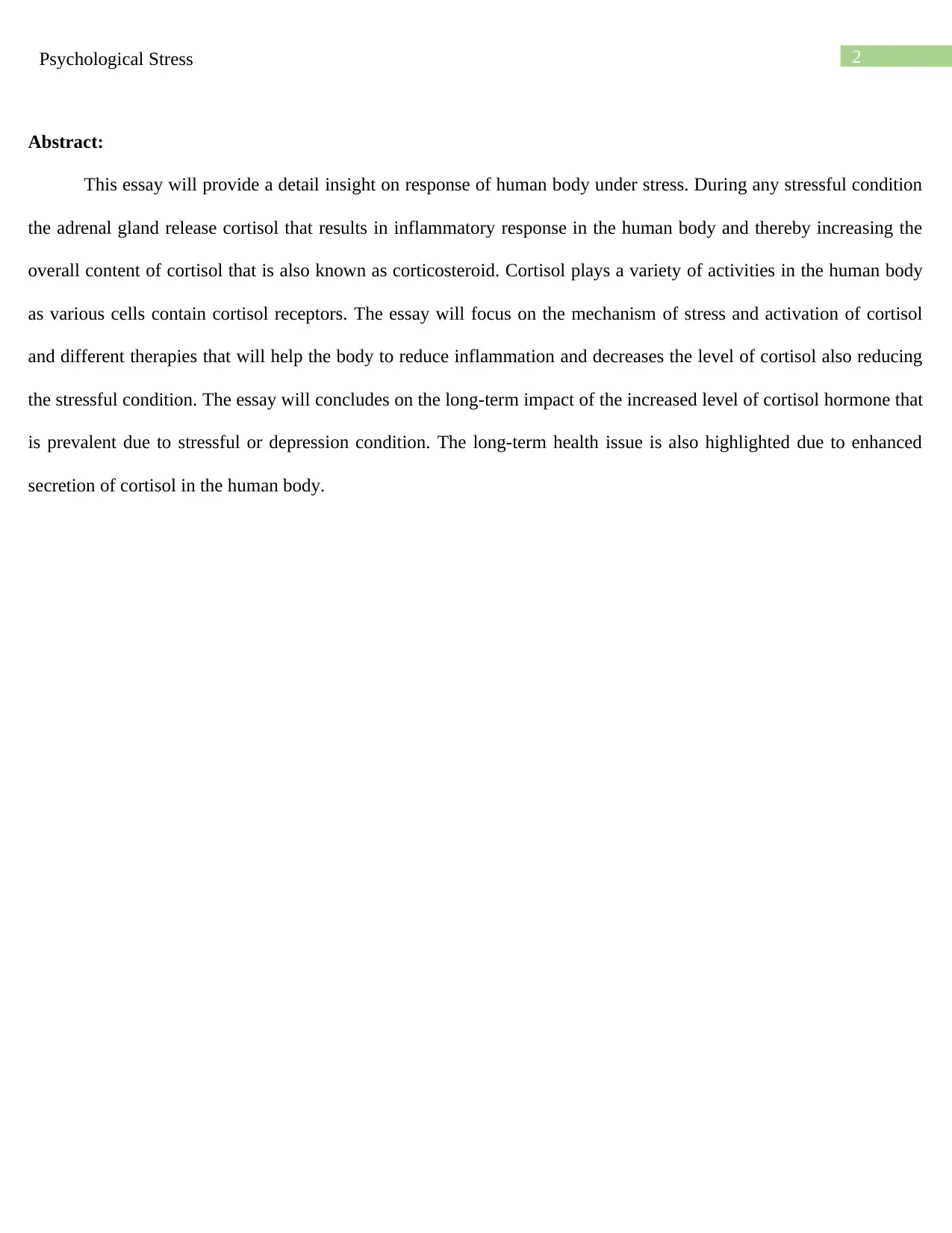
2Psychological Stress
Abstract:
This essay will provide a detail insight on response of human body under stress. During any stressful condition
the adrenal gland release cortisol that results in inflammatory response in the human body and thereby increasing the
overall content of cortisol that is also known as corticosteroid. Cortisol plays a variety of activities in the human body
as various cells contain cortisol receptors. The essay will focus on the mechanism of stress and activation of cortisol
and different therapies that will help the body to reduce inflammation and decreases the level of cortisol also reducing
the stressful condition. The essay will concludes on the long-term impact of the increased level of cortisol hormone that
is prevalent due to stressful or depression condition. The long-term health issue is also highlighted due to enhanced
secretion of cortisol in the human body.
Abstract:
This essay will provide a detail insight on response of human body under stress. During any stressful condition
the adrenal gland release cortisol that results in inflammatory response in the human body and thereby increasing the
overall content of cortisol that is also known as corticosteroid. Cortisol plays a variety of activities in the human body
as various cells contain cortisol receptors. The essay will focus on the mechanism of stress and activation of cortisol
and different therapies that will help the body to reduce inflammation and decreases the level of cortisol also reducing
the stressful condition. The essay will concludes on the long-term impact of the increased level of cortisol hormone that
is prevalent due to stressful or depression condition. The long-term health issue is also highlighted due to enhanced
secretion of cortisol in the human body.
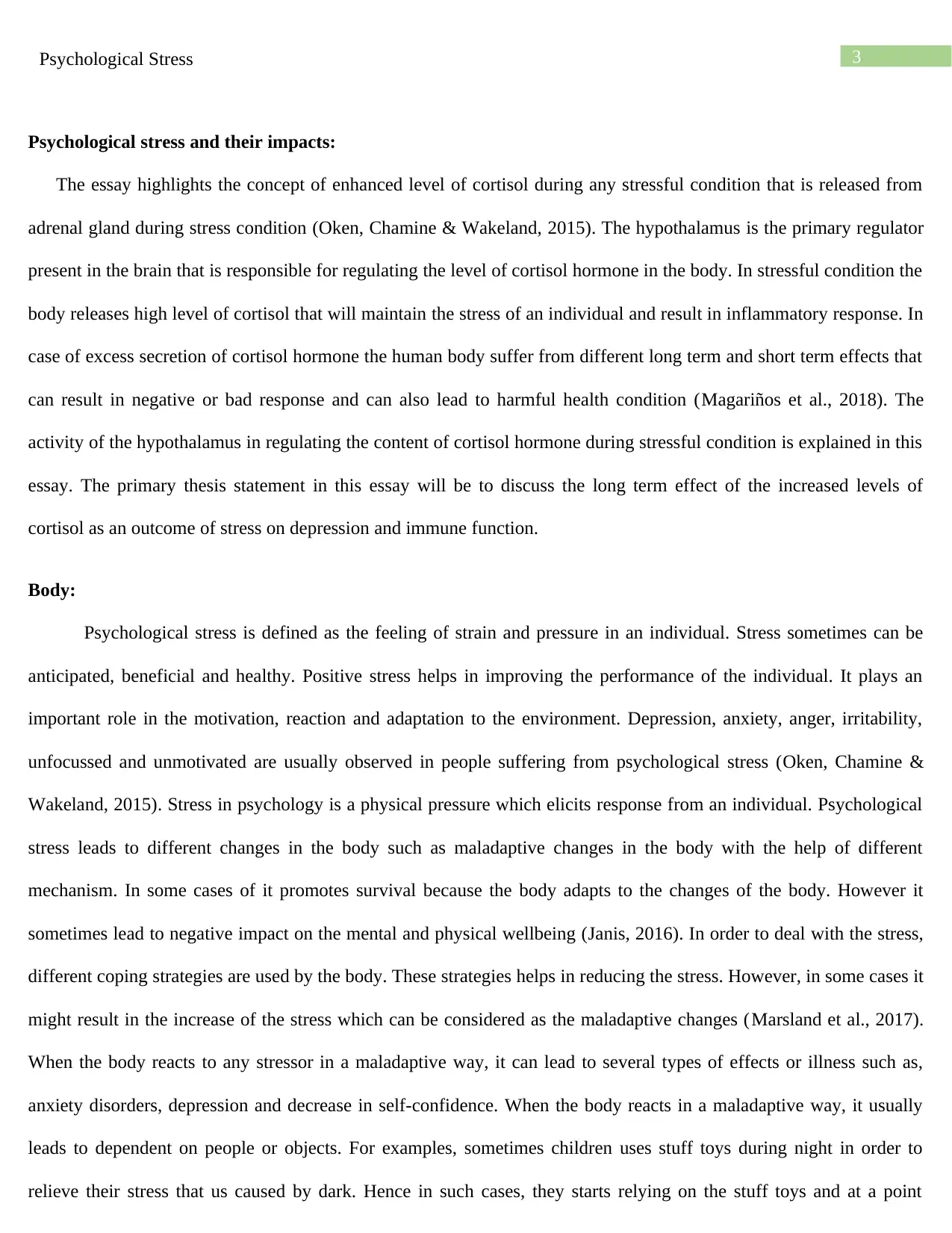
3Psychological Stress
Psychological stress and their impacts:
The essay highlights the concept of enhanced level of cortisol during any stressful condition that is released from
adrenal gland during stress condition (Oken, Chamine & Wakeland, 2015). The hypothalamus is the primary regulator
present in the brain that is responsible for regulating the level of cortisol hormone in the body. In stressful condition the
body releases high level of cortisol that will maintain the stress of an individual and result in inflammatory response. In
case of excess secretion of cortisol hormone the human body suffer from different long term and short term effects that
can result in negative or bad response and can also lead to harmful health condition (Magariños et al., 2018). The
activity of the hypothalamus in regulating the content of cortisol hormone during stressful condition is explained in this
essay. The primary thesis statement in this essay will be to discuss the long term effect of the increased levels of
cortisol as an outcome of stress on depression and immune function.
Body:
Psychological stress is defined as the feeling of strain and pressure in an individual. Stress sometimes can be
anticipated, beneficial and healthy. Positive stress helps in improving the performance of the individual. It plays an
important role in the motivation, reaction and adaptation to the environment. Depression, anxiety, anger, irritability,
unfocussed and unmotivated are usually observed in people suffering from psychological stress (Oken, Chamine &
Wakeland, 2015). Stress in psychology is a physical pressure which elicits response from an individual. Psychological
stress leads to different changes in the body such as maladaptive changes in the body with the help of different
mechanism. In some cases of it promotes survival because the body adapts to the changes of the body. However it
sometimes lead to negative impact on the mental and physical wellbeing (Janis, 2016). In order to deal with the stress,
different coping strategies are used by the body. These strategies helps in reducing the stress. However, in some cases it
might result in the increase of the stress which can be considered as the maladaptive changes (Marsland et al., 2017).
When the body reacts to any stressor in a maladaptive way, it can lead to several types of effects or illness such as,
anxiety disorders, depression and decrease in self-confidence. When the body reacts in a maladaptive way, it usually
leads to dependent on people or objects. For examples, sometimes children uses stuff toys during night in order to
relieve their stress that us caused by dark. Hence in such cases, they starts relying on the stuff toys and at a point
Psychological stress and their impacts:
The essay highlights the concept of enhanced level of cortisol during any stressful condition that is released from
adrenal gland during stress condition (Oken, Chamine & Wakeland, 2015). The hypothalamus is the primary regulator
present in the brain that is responsible for regulating the level of cortisol hormone in the body. In stressful condition the
body releases high level of cortisol that will maintain the stress of an individual and result in inflammatory response. In
case of excess secretion of cortisol hormone the human body suffer from different long term and short term effects that
can result in negative or bad response and can also lead to harmful health condition (Magariños et al., 2018). The
activity of the hypothalamus in regulating the content of cortisol hormone during stressful condition is explained in this
essay. The primary thesis statement in this essay will be to discuss the long term effect of the increased levels of
cortisol as an outcome of stress on depression and immune function.
Body:
Psychological stress is defined as the feeling of strain and pressure in an individual. Stress sometimes can be
anticipated, beneficial and healthy. Positive stress helps in improving the performance of the individual. It plays an
important role in the motivation, reaction and adaptation to the environment. Depression, anxiety, anger, irritability,
unfocussed and unmotivated are usually observed in people suffering from psychological stress (Oken, Chamine &
Wakeland, 2015). Stress in psychology is a physical pressure which elicits response from an individual. Psychological
stress leads to different changes in the body such as maladaptive changes in the body with the help of different
mechanism. In some cases of it promotes survival because the body adapts to the changes of the body. However it
sometimes lead to negative impact on the mental and physical wellbeing (Janis, 2016). In order to deal with the stress,
different coping strategies are used by the body. These strategies helps in reducing the stress. However, in some cases it
might result in the increase of the stress which can be considered as the maladaptive changes (Marsland et al., 2017).
When the body reacts to any stressor in a maladaptive way, it can lead to several types of effects or illness such as,
anxiety disorders, depression and decrease in self-confidence. When the body reacts in a maladaptive way, it usually
leads to dependent on people or objects. For examples, sometimes children uses stuff toys during night in order to
relieve their stress that us caused by dark. Hence in such cases, they starts relying on the stuff toys and at a point
⊘ This is a preview!⊘
Do you want full access?
Subscribe today to unlock all pages.

Trusted by 1+ million students worldwide
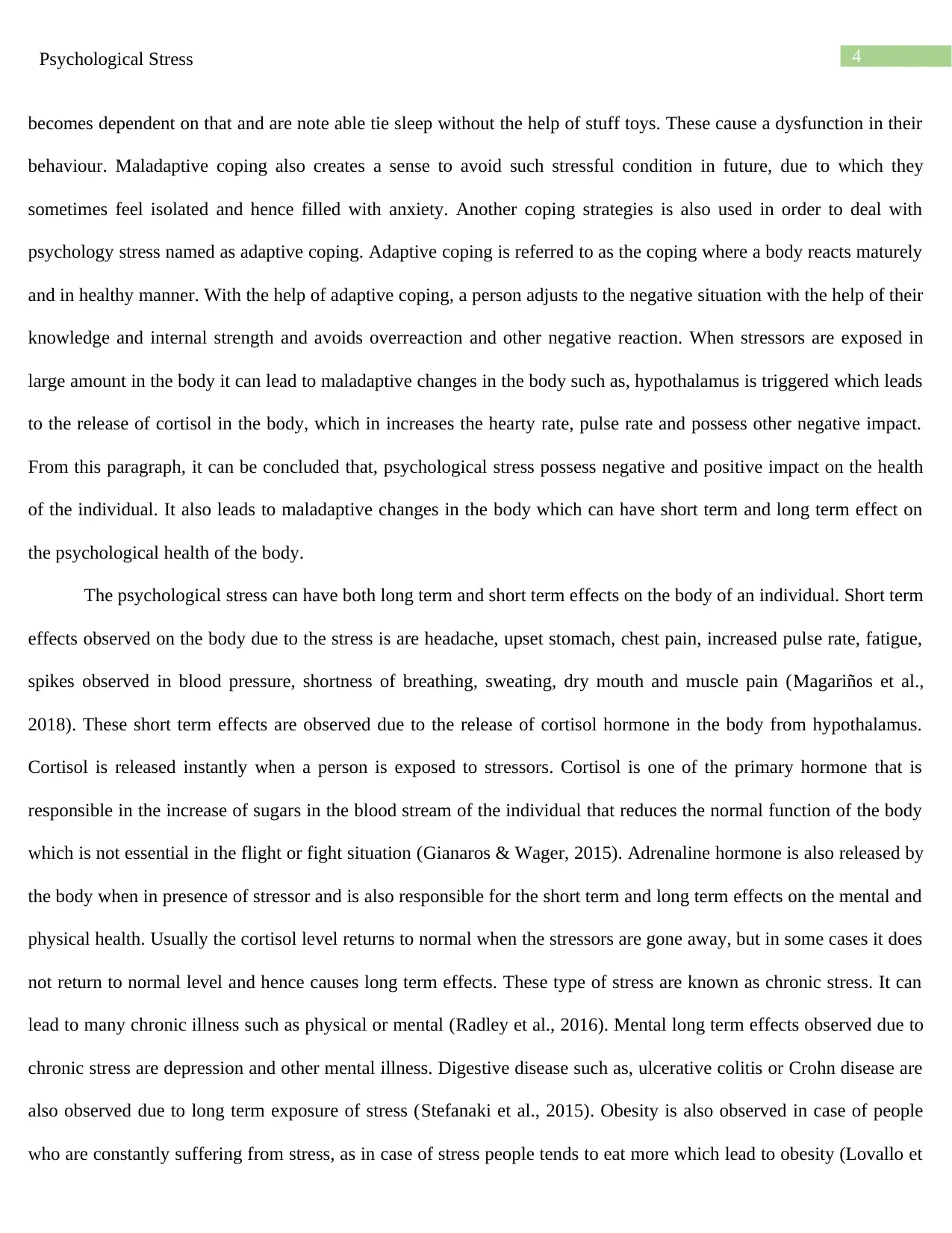
4Psychological Stress
becomes dependent on that and are note able tie sleep without the help of stuff toys. These cause a dysfunction in their
behaviour. Maladaptive coping also creates a sense to avoid such stressful condition in future, due to which they
sometimes feel isolated and hence filled with anxiety. Another coping strategies is also used in order to deal with
psychology stress named as adaptive coping. Adaptive coping is referred to as the coping where a body reacts maturely
and in healthy manner. With the help of adaptive coping, a person adjusts to the negative situation with the help of their
knowledge and internal strength and avoids overreaction and other negative reaction. When stressors are exposed in
large amount in the body it can lead to maladaptive changes in the body such as, hypothalamus is triggered which leads
to the release of cortisol in the body, which in increases the hearty rate, pulse rate and possess other negative impact.
From this paragraph, it can be concluded that, psychological stress possess negative and positive impact on the health
of the individual. It also leads to maladaptive changes in the body which can have short term and long term effect on
the psychological health of the body.
The psychological stress can have both long term and short term effects on the body of an individual. Short term
effects observed on the body due to the stress is are headache, upset stomach, chest pain, increased pulse rate, fatigue,
spikes observed in blood pressure, shortness of breathing, sweating, dry mouth and muscle pain (Magariños et al.,
2018). These short term effects are observed due to the release of cortisol hormone in the body from hypothalamus.
Cortisol is released instantly when a person is exposed to stressors. Cortisol is one of the primary hormone that is
responsible in the increase of sugars in the blood stream of the individual that reduces the normal function of the body
which is not essential in the flight or fight situation (Gianaros & Wager, 2015). Adrenaline hormone is also released by
the body when in presence of stressor and is also responsible for the short term and long term effects on the mental and
physical health. Usually the cortisol level returns to normal when the stressors are gone away, but in some cases it does
not return to normal level and hence causes long term effects. These type of stress are known as chronic stress. It can
lead to many chronic illness such as physical or mental (Radley et al., 2016). Mental long term effects observed due to
chronic stress are depression and other mental illness. Digestive disease such as, ulcerative colitis or Crohn disease are
also observed due to long term exposure of stress (Stefanaki et al., 2015). Obesity is also observed in case of people
who are constantly suffering from stress, as in case of stress people tends to eat more which lead to obesity (Lovallo et
becomes dependent on that and are note able tie sleep without the help of stuff toys. These cause a dysfunction in their
behaviour. Maladaptive coping also creates a sense to avoid such stressful condition in future, due to which they
sometimes feel isolated and hence filled with anxiety. Another coping strategies is also used in order to deal with
psychology stress named as adaptive coping. Adaptive coping is referred to as the coping where a body reacts maturely
and in healthy manner. With the help of adaptive coping, a person adjusts to the negative situation with the help of their
knowledge and internal strength and avoids overreaction and other negative reaction. When stressors are exposed in
large amount in the body it can lead to maladaptive changes in the body such as, hypothalamus is triggered which leads
to the release of cortisol in the body, which in increases the hearty rate, pulse rate and possess other negative impact.
From this paragraph, it can be concluded that, psychological stress possess negative and positive impact on the health
of the individual. It also leads to maladaptive changes in the body which can have short term and long term effect on
the psychological health of the body.
The psychological stress can have both long term and short term effects on the body of an individual. Short term
effects observed on the body due to the stress is are headache, upset stomach, chest pain, increased pulse rate, fatigue,
spikes observed in blood pressure, shortness of breathing, sweating, dry mouth and muscle pain (Magariños et al.,
2018). These short term effects are observed due to the release of cortisol hormone in the body from hypothalamus.
Cortisol is released instantly when a person is exposed to stressors. Cortisol is one of the primary hormone that is
responsible in the increase of sugars in the blood stream of the individual that reduces the normal function of the body
which is not essential in the flight or fight situation (Gianaros & Wager, 2015). Adrenaline hormone is also released by
the body when in presence of stressor and is also responsible for the short term and long term effects on the mental and
physical health. Usually the cortisol level returns to normal when the stressors are gone away, but in some cases it does
not return to normal level and hence causes long term effects. These type of stress are known as chronic stress. It can
lead to many chronic illness such as physical or mental (Radley et al., 2016). Mental long term effects observed due to
chronic stress are depression and other mental illness. Digestive disease such as, ulcerative colitis or Crohn disease are
also observed due to long term exposure of stress (Stefanaki et al., 2015). Obesity is also observed in case of people
who are constantly suffering from stress, as in case of stress people tends to eat more which lead to obesity (Lovallo et
Paraphrase This Document
Need a fresh take? Get an instant paraphrase of this document with our AI Paraphraser
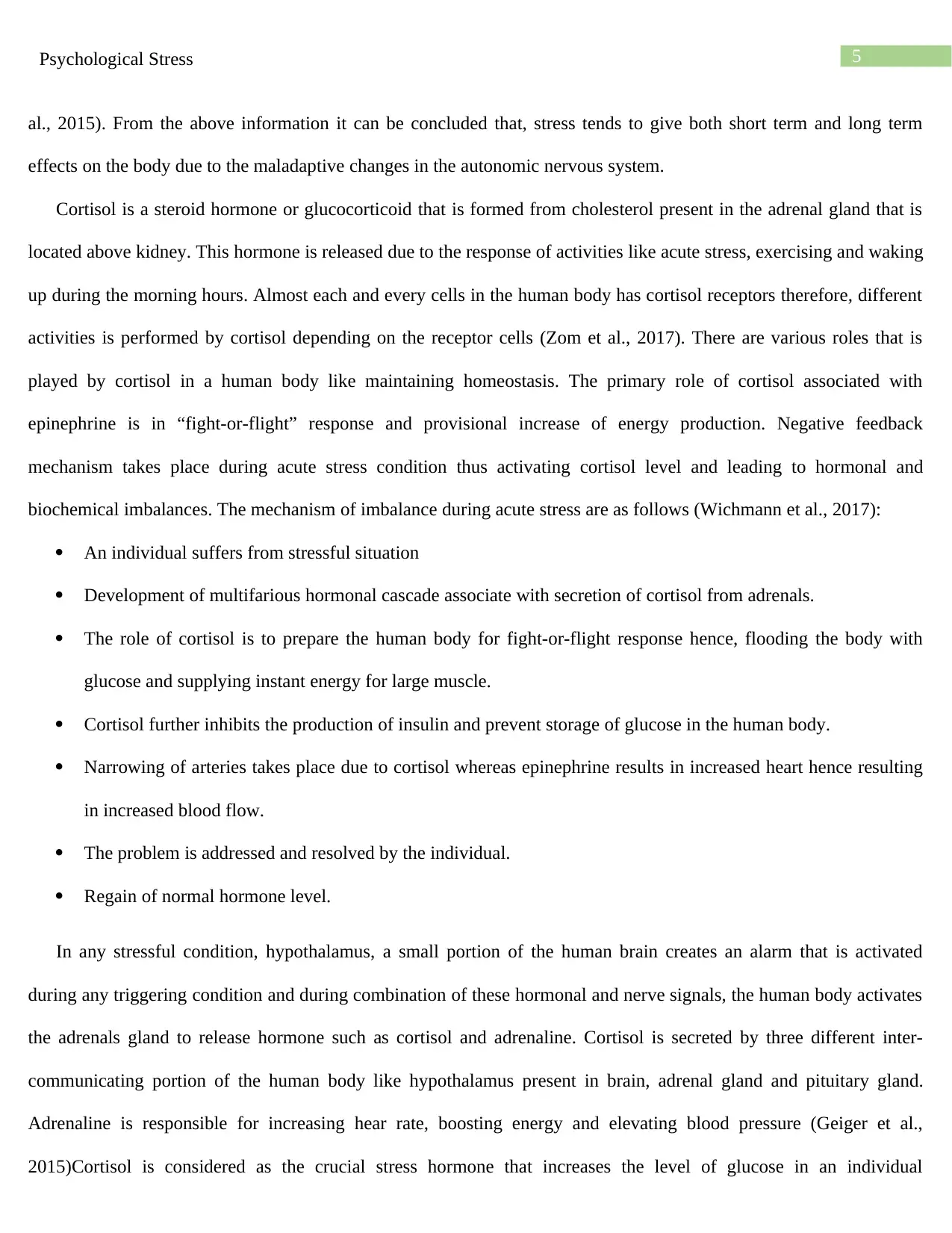
5Psychological Stress
al., 2015). From the above information it can be concluded that, stress tends to give both short term and long term
effects on the body due to the maladaptive changes in the autonomic nervous system.
Cortisol is a steroid hormone or glucocorticoid that is formed from cholesterol present in the adrenal gland that is
located above kidney. This hormone is released due to the response of activities like acute stress, exercising and waking
up during the morning hours. Almost each and every cells in the human body has cortisol receptors therefore, different
activities is performed by cortisol depending on the receptor cells (Zom et al., 2017). There are various roles that is
played by cortisol in a human body like maintaining homeostasis. The primary role of cortisol associated with
epinephrine is in “fight-or-flight” response and provisional increase of energy production. Negative feedback
mechanism takes place during acute stress condition thus activating cortisol level and leading to hormonal and
biochemical imbalances. The mechanism of imbalance during acute stress are as follows (Wichmann et al., 2017):
An individual suffers from stressful situation
Development of multifarious hormonal cascade associate with secretion of cortisol from adrenals.
The role of cortisol is to prepare the human body for fight-or-flight response hence, flooding the body with
glucose and supplying instant energy for large muscle.
Cortisol further inhibits the production of insulin and prevent storage of glucose in the human body.
Narrowing of arteries takes place due to cortisol whereas epinephrine results in increased heart hence resulting
in increased blood flow.
The problem is addressed and resolved by the individual.
Regain of normal hormone level.
In any stressful condition, hypothalamus, a small portion of the human brain creates an alarm that is activated
during any triggering condition and during combination of these hormonal and nerve signals, the human body activates
the adrenals gland to release hormone such as cortisol and adrenaline. Cortisol is secreted by three different inter-
communicating portion of the human body like hypothalamus present in brain, adrenal gland and pituitary gland.
Adrenaline is responsible for increasing hear rate, boosting energy and elevating blood pressure (Geiger et al.,
2015)Cortisol is considered as the crucial stress hormone that increases the level of glucose in an individual
al., 2015). From the above information it can be concluded that, stress tends to give both short term and long term
effects on the body due to the maladaptive changes in the autonomic nervous system.
Cortisol is a steroid hormone or glucocorticoid that is formed from cholesterol present in the adrenal gland that is
located above kidney. This hormone is released due to the response of activities like acute stress, exercising and waking
up during the morning hours. Almost each and every cells in the human body has cortisol receptors therefore, different
activities is performed by cortisol depending on the receptor cells (Zom et al., 2017). There are various roles that is
played by cortisol in a human body like maintaining homeostasis. The primary role of cortisol associated with
epinephrine is in “fight-or-flight” response and provisional increase of energy production. Negative feedback
mechanism takes place during acute stress condition thus activating cortisol level and leading to hormonal and
biochemical imbalances. The mechanism of imbalance during acute stress are as follows (Wichmann et al., 2017):
An individual suffers from stressful situation
Development of multifarious hormonal cascade associate with secretion of cortisol from adrenals.
The role of cortisol is to prepare the human body for fight-or-flight response hence, flooding the body with
glucose and supplying instant energy for large muscle.
Cortisol further inhibits the production of insulin and prevent storage of glucose in the human body.
Narrowing of arteries takes place due to cortisol whereas epinephrine results in increased heart hence resulting
in increased blood flow.
The problem is addressed and resolved by the individual.
Regain of normal hormone level.
In any stressful condition, hypothalamus, a small portion of the human brain creates an alarm that is activated
during any triggering condition and during combination of these hormonal and nerve signals, the human body activates
the adrenals gland to release hormone such as cortisol and adrenaline. Cortisol is secreted by three different inter-
communicating portion of the human body like hypothalamus present in brain, adrenal gland and pituitary gland.
Adrenaline is responsible for increasing hear rate, boosting energy and elevating blood pressure (Geiger et al.,
2015)Cortisol is considered as the crucial stress hormone that increases the level of glucose in an individual
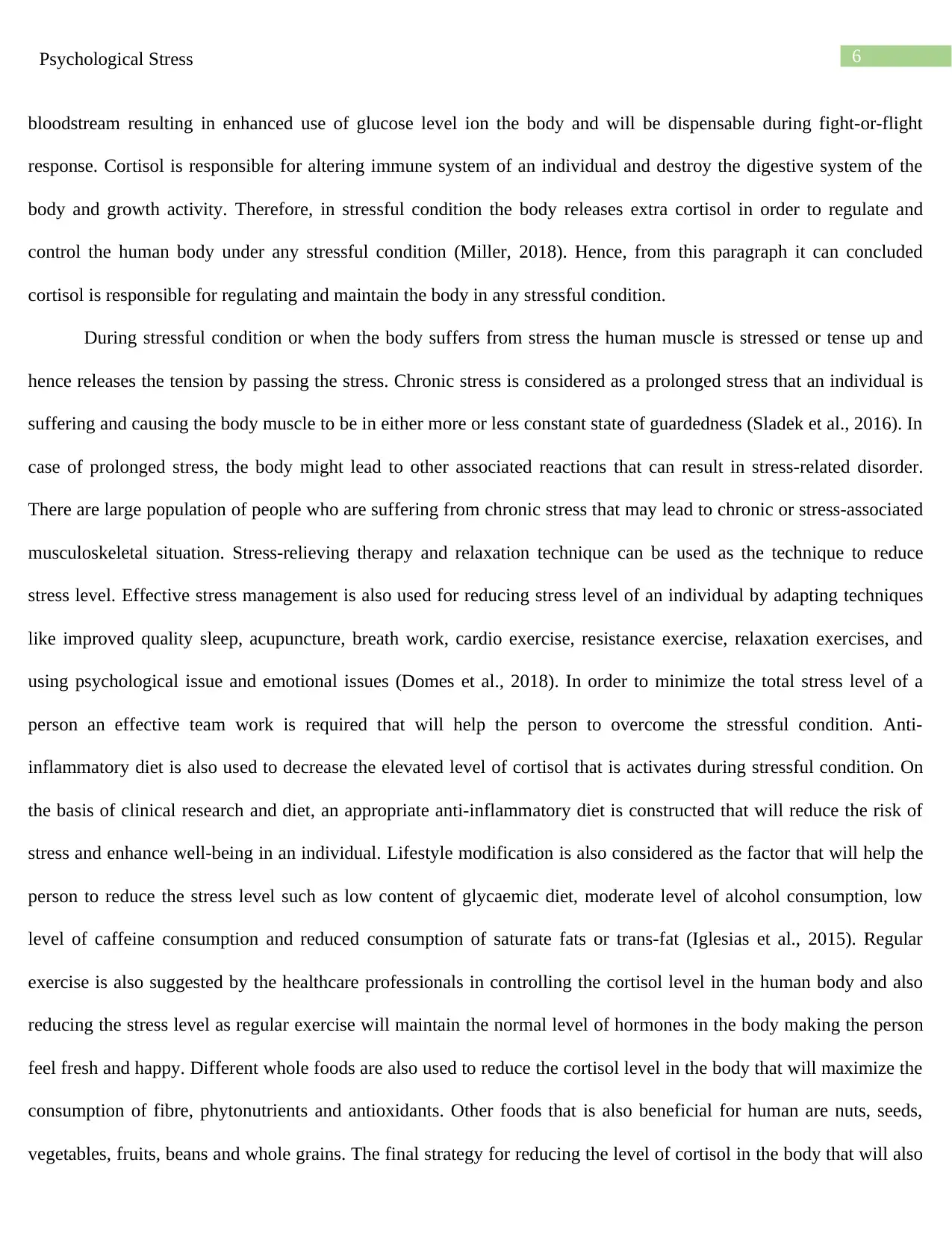
6Psychological Stress
bloodstream resulting in enhanced use of glucose level ion the body and will be dispensable during fight-or-flight
response. Cortisol is responsible for altering immune system of an individual and destroy the digestive system of the
body and growth activity. Therefore, in stressful condition the body releases extra cortisol in order to regulate and
control the human body under any stressful condition (Miller, 2018). Hence, from this paragraph it can concluded
cortisol is responsible for regulating and maintain the body in any stressful condition.
During stressful condition or when the body suffers from stress the human muscle is stressed or tense up and
hence releases the tension by passing the stress. Chronic stress is considered as a prolonged stress that an individual is
suffering and causing the body muscle to be in either more or less constant state of guardedness (Sladek et al., 2016). In
case of prolonged stress, the body might lead to other associated reactions that can result in stress-related disorder.
There are large population of people who are suffering from chronic stress that may lead to chronic or stress-associated
musculoskeletal situation. Stress-relieving therapy and relaxation technique can be used as the technique to reduce
stress level. Effective stress management is also used for reducing stress level of an individual by adapting techniques
like improved quality sleep, acupuncture, breath work, cardio exercise, resistance exercise, relaxation exercises, and
using psychological issue and emotional issues (Domes et al., 2018). In order to minimize the total stress level of a
person an effective team work is required that will help the person to overcome the stressful condition. Anti-
inflammatory diet is also used to decrease the elevated level of cortisol that is activates during stressful condition. On
the basis of clinical research and diet, an appropriate anti-inflammatory diet is constructed that will reduce the risk of
stress and enhance well-being in an individual. Lifestyle modification is also considered as the factor that will help the
person to reduce the stress level such as low content of glycaemic diet, moderate level of alcohol consumption, low
level of caffeine consumption and reduced consumption of saturate fats or trans-fat (Iglesias et al., 2015). Regular
exercise is also suggested by the healthcare professionals in controlling the cortisol level in the human body and also
reducing the stress level as regular exercise will maintain the normal level of hormones in the body making the person
feel fresh and happy. Different whole foods are also used to reduce the cortisol level in the body that will maximize the
consumption of fibre, phytonutrients and antioxidants. Other foods that is also beneficial for human are nuts, seeds,
vegetables, fruits, beans and whole grains. The final strategy for reducing the level of cortisol in the body that will also
bloodstream resulting in enhanced use of glucose level ion the body and will be dispensable during fight-or-flight
response. Cortisol is responsible for altering immune system of an individual and destroy the digestive system of the
body and growth activity. Therefore, in stressful condition the body releases extra cortisol in order to regulate and
control the human body under any stressful condition (Miller, 2018). Hence, from this paragraph it can concluded
cortisol is responsible for regulating and maintain the body in any stressful condition.
During stressful condition or when the body suffers from stress the human muscle is stressed or tense up and
hence releases the tension by passing the stress. Chronic stress is considered as a prolonged stress that an individual is
suffering and causing the body muscle to be in either more or less constant state of guardedness (Sladek et al., 2016). In
case of prolonged stress, the body might lead to other associated reactions that can result in stress-related disorder.
There are large population of people who are suffering from chronic stress that may lead to chronic or stress-associated
musculoskeletal situation. Stress-relieving therapy and relaxation technique can be used as the technique to reduce
stress level. Effective stress management is also used for reducing stress level of an individual by adapting techniques
like improved quality sleep, acupuncture, breath work, cardio exercise, resistance exercise, relaxation exercises, and
using psychological issue and emotional issues (Domes et al., 2018). In order to minimize the total stress level of a
person an effective team work is required that will help the person to overcome the stressful condition. Anti-
inflammatory diet is also used to decrease the elevated level of cortisol that is activates during stressful condition. On
the basis of clinical research and diet, an appropriate anti-inflammatory diet is constructed that will reduce the risk of
stress and enhance well-being in an individual. Lifestyle modification is also considered as the factor that will help the
person to reduce the stress level such as low content of glycaemic diet, moderate level of alcohol consumption, low
level of caffeine consumption and reduced consumption of saturate fats or trans-fat (Iglesias et al., 2015). Regular
exercise is also suggested by the healthcare professionals in controlling the cortisol level in the human body and also
reducing the stress level as regular exercise will maintain the normal level of hormones in the body making the person
feel fresh and happy. Different whole foods are also used to reduce the cortisol level in the body that will maximize the
consumption of fibre, phytonutrients and antioxidants. Other foods that is also beneficial for human are nuts, seeds,
vegetables, fruits, beans and whole grains. The final strategy for reducing the level of cortisol in the body that will also
⊘ This is a preview!⊘
Do you want full access?
Subscribe today to unlock all pages.

Trusted by 1+ million students worldwide
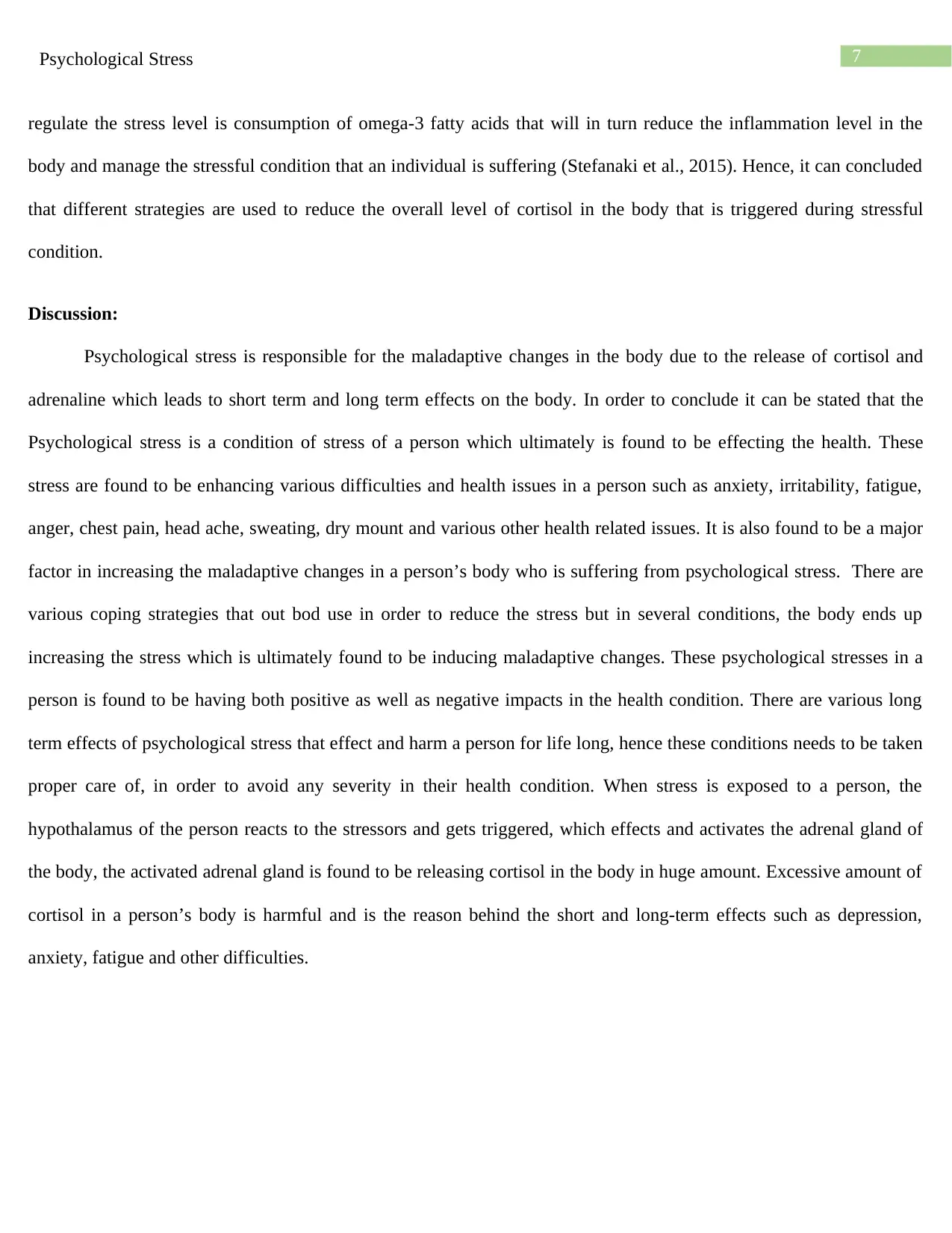
7Psychological Stress
regulate the stress level is consumption of omega-3 fatty acids that will in turn reduce the inflammation level in the
body and manage the stressful condition that an individual is suffering (Stefanaki et al., 2015). Hence, it can concluded
that different strategies are used to reduce the overall level of cortisol in the body that is triggered during stressful
condition.
Discussion:
Psychological stress is responsible for the maladaptive changes in the body due to the release of cortisol and
adrenaline which leads to short term and long term effects on the body. In order to conclude it can be stated that the
Psychological stress is a condition of stress of a person which ultimately is found to be effecting the health. These
stress are found to be enhancing various difficulties and health issues in a person such as anxiety, irritability, fatigue,
anger, chest pain, head ache, sweating, dry mount and various other health related issues. It is also found to be a major
factor in increasing the maladaptive changes in a person’s body who is suffering from psychological stress. There are
various coping strategies that out bod use in order to reduce the stress but in several conditions, the body ends up
increasing the stress which is ultimately found to be inducing maladaptive changes. These psychological stresses in a
person is found to be having both positive as well as negative impacts in the health condition. There are various long
term effects of psychological stress that effect and harm a person for life long, hence these conditions needs to be taken
proper care of, in order to avoid any severity in their health condition. When stress is exposed to a person, the
hypothalamus of the person reacts to the stressors and gets triggered, which effects and activates the adrenal gland of
the body, the activated adrenal gland is found to be releasing cortisol in the body in huge amount. Excessive amount of
cortisol in a person’s body is harmful and is the reason behind the short and long-term effects such as depression,
anxiety, fatigue and other difficulties.
regulate the stress level is consumption of omega-3 fatty acids that will in turn reduce the inflammation level in the
body and manage the stressful condition that an individual is suffering (Stefanaki et al., 2015). Hence, it can concluded
that different strategies are used to reduce the overall level of cortisol in the body that is triggered during stressful
condition.
Discussion:
Psychological stress is responsible for the maladaptive changes in the body due to the release of cortisol and
adrenaline which leads to short term and long term effects on the body. In order to conclude it can be stated that the
Psychological stress is a condition of stress of a person which ultimately is found to be effecting the health. These
stress are found to be enhancing various difficulties and health issues in a person such as anxiety, irritability, fatigue,
anger, chest pain, head ache, sweating, dry mount and various other health related issues. It is also found to be a major
factor in increasing the maladaptive changes in a person’s body who is suffering from psychological stress. There are
various coping strategies that out bod use in order to reduce the stress but in several conditions, the body ends up
increasing the stress which is ultimately found to be inducing maladaptive changes. These psychological stresses in a
person is found to be having both positive as well as negative impacts in the health condition. There are various long
term effects of psychological stress that effect and harm a person for life long, hence these conditions needs to be taken
proper care of, in order to avoid any severity in their health condition. When stress is exposed to a person, the
hypothalamus of the person reacts to the stressors and gets triggered, which effects and activates the adrenal gland of
the body, the activated adrenal gland is found to be releasing cortisol in the body in huge amount. Excessive amount of
cortisol in a person’s body is harmful and is the reason behind the short and long-term effects such as depression,
anxiety, fatigue and other difficulties.
Paraphrase This Document
Need a fresh take? Get an instant paraphrase of this document with our AI Paraphraser
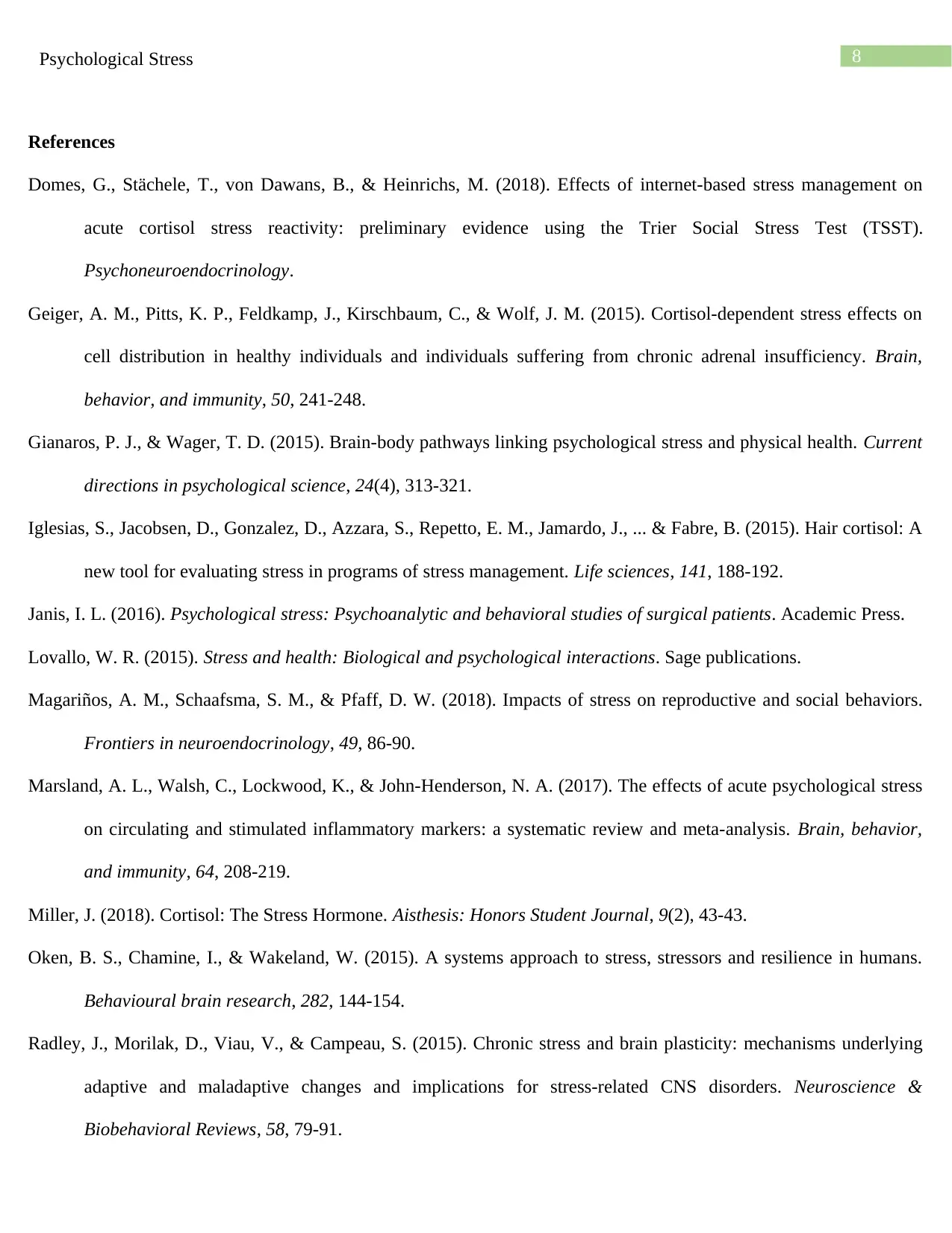
8Psychological Stress
References
Domes, G., Stächele, T., von Dawans, B., & Heinrichs, M. (2018). Effects of internet-based stress management on
acute cortisol stress reactivity: preliminary evidence using the Trier Social Stress Test (TSST).
Psychoneuroendocrinology.
Geiger, A. M., Pitts, K. P., Feldkamp, J., Kirschbaum, C., & Wolf, J. M. (2015). Cortisol-dependent stress effects on
cell distribution in healthy individuals and individuals suffering from chronic adrenal insufficiency. Brain,
behavior, and immunity, 50, 241-248.
Gianaros, P. J., & Wager, T. D. (2015). Brain-body pathways linking psychological stress and physical health. Current
directions in psychological science, 24(4), 313-321.
Iglesias, S., Jacobsen, D., Gonzalez, D., Azzara, S., Repetto, E. M., Jamardo, J., ... & Fabre, B. (2015). Hair cortisol: A
new tool for evaluating stress in programs of stress management. Life sciences, 141, 188-192.
Janis, I. L. (2016). Psychological stress: Psychoanalytic and behavioral studies of surgical patients. Academic Press.
Lovallo, W. R. (2015). Stress and health: Biological and psychological interactions. Sage publications.
Magariños, A. M., Schaafsma, S. M., & Pfaff, D. W. (2018). Impacts of stress on reproductive and social behaviors.
Frontiers in neuroendocrinology, 49, 86-90.
Marsland, A. L., Walsh, C., Lockwood, K., & John-Henderson, N. A. (2017). The effects of acute psychological stress
on circulating and stimulated inflammatory markers: a systematic review and meta-analysis. Brain, behavior,
and immunity, 64, 208-219.
Miller, J. (2018). Cortisol: The Stress Hormone. Aisthesis: Honors Student Journal, 9(2), 43-43.
Oken, B. S., Chamine, I., & Wakeland, W. (2015). A systems approach to stress, stressors and resilience in humans.
Behavioural brain research, 282, 144-154.
Radley, J., Morilak, D., Viau, V., & Campeau, S. (2015). Chronic stress and brain plasticity: mechanisms underlying
adaptive and maladaptive changes and implications for stress-related CNS disorders. Neuroscience &
Biobehavioral Reviews, 58, 79-91.
References
Domes, G., Stächele, T., von Dawans, B., & Heinrichs, M. (2018). Effects of internet-based stress management on
acute cortisol stress reactivity: preliminary evidence using the Trier Social Stress Test (TSST).
Psychoneuroendocrinology.
Geiger, A. M., Pitts, K. P., Feldkamp, J., Kirschbaum, C., & Wolf, J. M. (2015). Cortisol-dependent stress effects on
cell distribution in healthy individuals and individuals suffering from chronic adrenal insufficiency. Brain,
behavior, and immunity, 50, 241-248.
Gianaros, P. J., & Wager, T. D. (2015). Brain-body pathways linking psychological stress and physical health. Current
directions in psychological science, 24(4), 313-321.
Iglesias, S., Jacobsen, D., Gonzalez, D., Azzara, S., Repetto, E. M., Jamardo, J., ... & Fabre, B. (2015). Hair cortisol: A
new tool for evaluating stress in programs of stress management. Life sciences, 141, 188-192.
Janis, I. L. (2016). Psychological stress: Psychoanalytic and behavioral studies of surgical patients. Academic Press.
Lovallo, W. R. (2015). Stress and health: Biological and psychological interactions. Sage publications.
Magariños, A. M., Schaafsma, S. M., & Pfaff, D. W. (2018). Impacts of stress on reproductive and social behaviors.
Frontiers in neuroendocrinology, 49, 86-90.
Marsland, A. L., Walsh, C., Lockwood, K., & John-Henderson, N. A. (2017). The effects of acute psychological stress
on circulating and stimulated inflammatory markers: a systematic review and meta-analysis. Brain, behavior,
and immunity, 64, 208-219.
Miller, J. (2018). Cortisol: The Stress Hormone. Aisthesis: Honors Student Journal, 9(2), 43-43.
Oken, B. S., Chamine, I., & Wakeland, W. (2015). A systems approach to stress, stressors and resilience in humans.
Behavioural brain research, 282, 144-154.
Radley, J., Morilak, D., Viau, V., & Campeau, S. (2015). Chronic stress and brain plasticity: mechanisms underlying
adaptive and maladaptive changes and implications for stress-related CNS disorders. Neuroscience &
Biobehavioral Reviews, 58, 79-91.
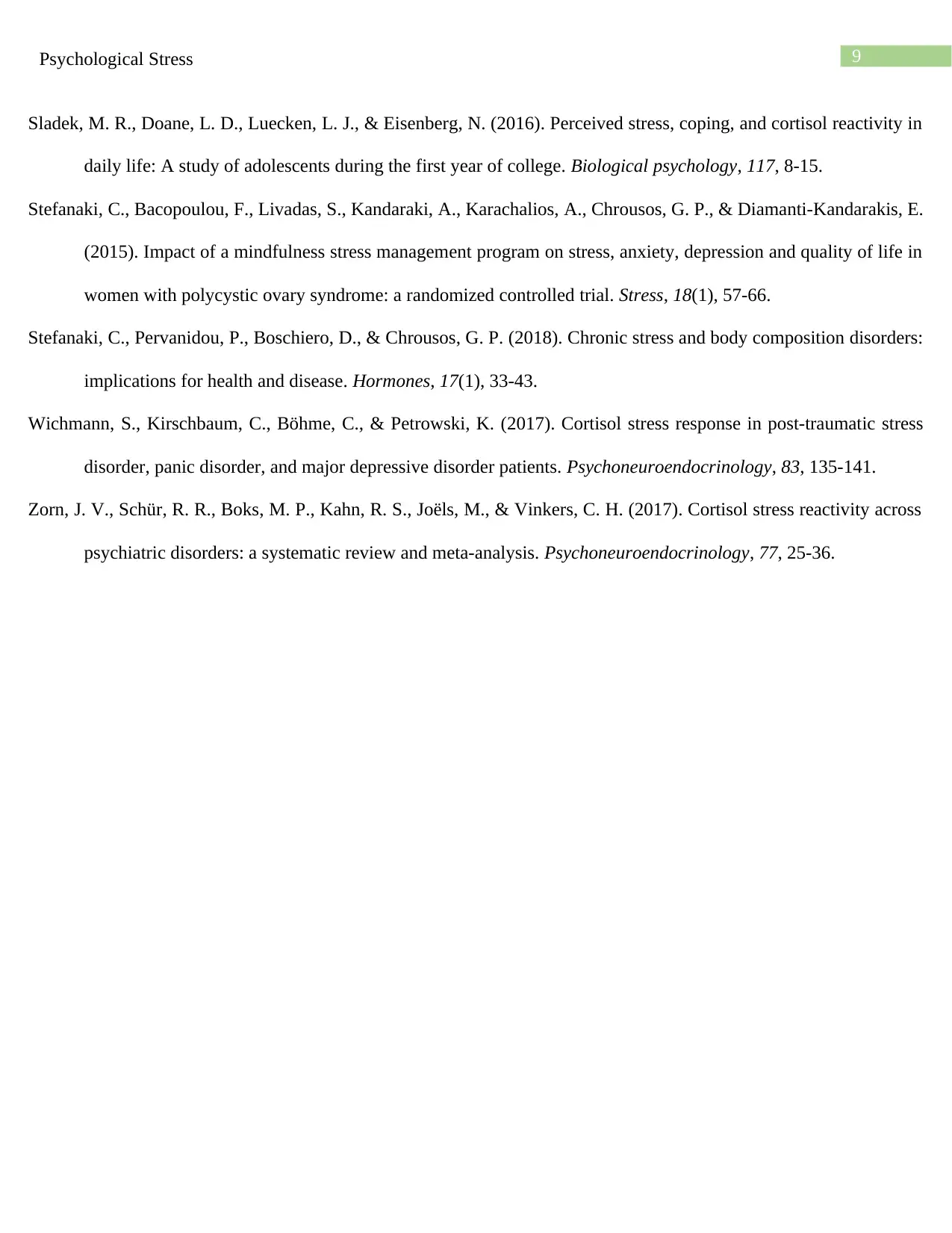
9Psychological Stress
Sladek, M. R., Doane, L. D., Luecken, L. J., & Eisenberg, N. (2016). Perceived stress, coping, and cortisol reactivity in
daily life: A study of adolescents during the first year of college. Biological psychology, 117, 8-15.
Stefanaki, C., Bacopoulou, F., Livadas, S., Kandaraki, A., Karachalios, A., Chrousos, G. P., & Diamanti-Kandarakis, E.
(2015). Impact of a mindfulness stress management program on stress, anxiety, depression and quality of life in
women with polycystic ovary syndrome: a randomized controlled trial. Stress, 18(1), 57-66.
Stefanaki, C., Pervanidou, P., Boschiero, D., & Chrousos, G. P. (2018). Chronic stress and body composition disorders:
implications for health and disease. Hormones, 17(1), 33-43.
Wichmann, S., Kirschbaum, C., Böhme, C., & Petrowski, K. (2017). Cortisol stress response in post-traumatic stress
disorder, panic disorder, and major depressive disorder patients. Psychoneuroendocrinology, 83, 135-141.
Zorn, J. V., Schür, R. R., Boks, M. P., Kahn, R. S., Joëls, M., & Vinkers, C. H. (2017). Cortisol stress reactivity across
psychiatric disorders: a systematic review and meta-analysis. Psychoneuroendocrinology, 77, 25-36.
Sladek, M. R., Doane, L. D., Luecken, L. J., & Eisenberg, N. (2016). Perceived stress, coping, and cortisol reactivity in
daily life: A study of adolescents during the first year of college. Biological psychology, 117, 8-15.
Stefanaki, C., Bacopoulou, F., Livadas, S., Kandaraki, A., Karachalios, A., Chrousos, G. P., & Diamanti-Kandarakis, E.
(2015). Impact of a mindfulness stress management program on stress, anxiety, depression and quality of life in
women with polycystic ovary syndrome: a randomized controlled trial. Stress, 18(1), 57-66.
Stefanaki, C., Pervanidou, P., Boschiero, D., & Chrousos, G. P. (2018). Chronic stress and body composition disorders:
implications for health and disease. Hormones, 17(1), 33-43.
Wichmann, S., Kirschbaum, C., Böhme, C., & Petrowski, K. (2017). Cortisol stress response in post-traumatic stress
disorder, panic disorder, and major depressive disorder patients. Psychoneuroendocrinology, 83, 135-141.
Zorn, J. V., Schür, R. R., Boks, M. P., Kahn, R. S., Joëls, M., & Vinkers, C. H. (2017). Cortisol stress reactivity across
psychiatric disorders: a systematic review and meta-analysis. Psychoneuroendocrinology, 77, 25-36.
⊘ This is a preview!⊘
Do you want full access?
Subscribe today to unlock all pages.

Trusted by 1+ million students worldwide
1 out of 9
Related Documents
Your All-in-One AI-Powered Toolkit for Academic Success.
+13062052269
info@desklib.com
Available 24*7 on WhatsApp / Email
![[object Object]](/_next/static/media/star-bottom.7253800d.svg)
Unlock your academic potential
Copyright © 2020–2026 A2Z Services. All Rights Reserved. Developed and managed by ZUCOL.



